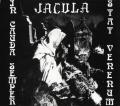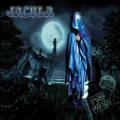 Jacula is an Italian progressive rock band founded in 1968 in Milan as an experiment by Antonio Bartoccetti, Doris Norton (also known as Fiamma Dello Spirito), organist Charles Tiring and medium Franz Porthenzy. Jacula's music was considered innovative for the time in progressive circles but considered dark and strange by most fans and analysts of the genre, especially in an era that included the development of groups such as Pink Floyd, Genesis and Gentle Giant, bands which were the basis of the new progressive rock scene. "After listening carefully to this Jacula's In cauda semper stat venenum again, and attending to the insistent versions that claim that this album is a fraud and a fiasco, there are certain disquisitions that come to mind, and that are worth a second review.Supposedly the LP was recorded and released in 1969, supposedly 310 copies were pressed (not even one more), and they were –supposedly- distributed among occultist European sects and black-arts followers, magic-men, wizards, astrologers or hexes.The guitar riffs that can be heard here –sporadically-, bring Black Sabbath to mind, these riffs are intertwined with an organ (according to the legend, the organist, who was organist of a church, after satanic pact, stole the organ and ran away).In the track “Triumphatus sad”, can be heard more clearly these riffs, also in the first song “Ritus”: those are pretty modern heavy metal riffs, there is a vibe of goth metal flying over the album during its 37 minutes, and -very important this- in “Triumphatus sad” some suspiciously 80s or 90s FX can be heard: it can not be from 1969, definitely.Honestly I am leaving aside the artistic worth of this record, to mention the extra-musical factors: concretely the question here is if In cauda semper stat venenum was effectively “doctored” on a studio many years after 1969, to be released on CD.There is a very suggestive sequel for this record that could throw some light, and it is Tardo pede in magiam versus, a sophomore disc to this Jacula, apparently from 1972: this record sounds very similar to how In cauda semper stat venenum would sound, if it hadn't its heavy riffs.So was "In cauda..." turned into fraudulent early Italo Doom for the 1990s and 2000s taste of the proto-metal archaeologist, or not?Hand on heart, the suspicions are several, the sound is too un-1969, for moments, even it's modern for the late 70s...hmm.Listening to it again, and in a lossless copy, I do confirm the wishy-washy inspiration of this "gem"; its -once again- archaeological more than artistic value and, in the last track “In cauda semper”, those extraneous, modern metal guitar riffs and sound.That male voice (a narrator more than a singer), keeps on reciting his macabre speech in Italian, with some phrase in Latin, it does remind me of some voices I've heard in 70s Italian movies, with Adriano Celentano, Lando Buzzanca, Nino Manfredi: the album ends...the enigma goes on.What is exactly In cauda semper stat venenum after all? What is the real story behind all this, and who the heck were Jacula? Among the personnel involved in this –at least- dubious LP, there is a medium, you know, one of these personages who supposedly talk to the dead.Was Jacula, and this two-albums career a joke perhaps? There is something of commercial manoeuvre or much of bizarre artistry behind this masquerade? Its extra-musical whatnots outnumber clearly its muses." - review by someone...
- Anthony Bartoccetti - guitar, bass & vocals
- Charels Tiring - keyboards
- Doris Norton - drums, special effects
- Fiamma Dallo Spirito - vocals, violin, flute
Tracks / Треклист:
01. Ajtus (04:06)
02. Magister Dixit (10:30)
03. Triumphatus Sad (03:35)
04. Veneficium (02:21)
05. Initiatjo (06:49)
06. In Cauda Semper Stat Venenum (10:05)
|
 Jacula is an Italian progressive rock band founded in 1968 in Milan as an experiment by Antonio Bartoccetti, Doris Norton (also known as Fiamma Dello Spirito), organist Charles Tiring and medium Franz Porthenzy.
Jacula is an Italian progressive rock band founded in 1968 in Milan as an experiment by Antonio Bartoccetti, Doris Norton (also known as Fiamma Dello Spirito), organist Charles Tiring and medium Franz Porthenzy.




 1
1 0
0